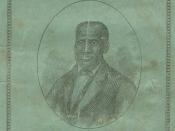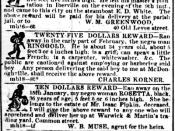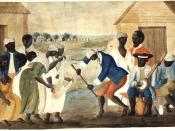Onavlik 1
TU Chemnitz
Faculty of Humanities
English and American Studies
SS 2012
Slave Narratives
Birte Heidemann
The Issue of Objectivity Regarding Fictional Slave Narratives
in Caryl Phillips' Cambridge
Hande ONAVLIK
English and American Studies, B_AA (Erasmus)
Tel: +905546161656
hande.onavlik@gmail.com
Onavlik 2
Table of Contents
- Introduction (P. 3 - 5)
- A General Outlook on Objectivity and Persuasion (P. 5 - 8)
- Fictional Characters as Sources of Objectivity (P. 8 - 14)
- Conclusion (P. 15)
- Works Cited (P.16)
Onavlik 3
INTRODUCTION
"Slavery is a system under which people are treated as property to be bought and sold,
and are forced to work." (Brace 162). Now, in the 21st century we are only 200 years away
from a time when this system was the most influental profitting system known to mankind.
The historical implications on this matter are best conveyed by William L. Andrews. He says:
"Close to two million slaves were brought to the American South from Africa and the West
Indies during the centuries of the Atlantic slave trade. Approximately 20% of the population
of the American South over the years has been African American." (Andrews 2)
This large man force that consisted mainly of black people is what maintained the
main labor constitution for many years even after the emancipation. In those years of racism
and slavery black people have been exposed to a certain principle that automatically makes
them inferior to anything that is remotely white. This hierarchial culture was embedded to the
black person and white person alike to "sanction and support the whole range of
discrimination that has characterized white supremacy in its successive stages." (Andrews 2)
The slaves' opinion and experiences in these matters were for many years devoid of
form and communication; however the victims themselves had not...


